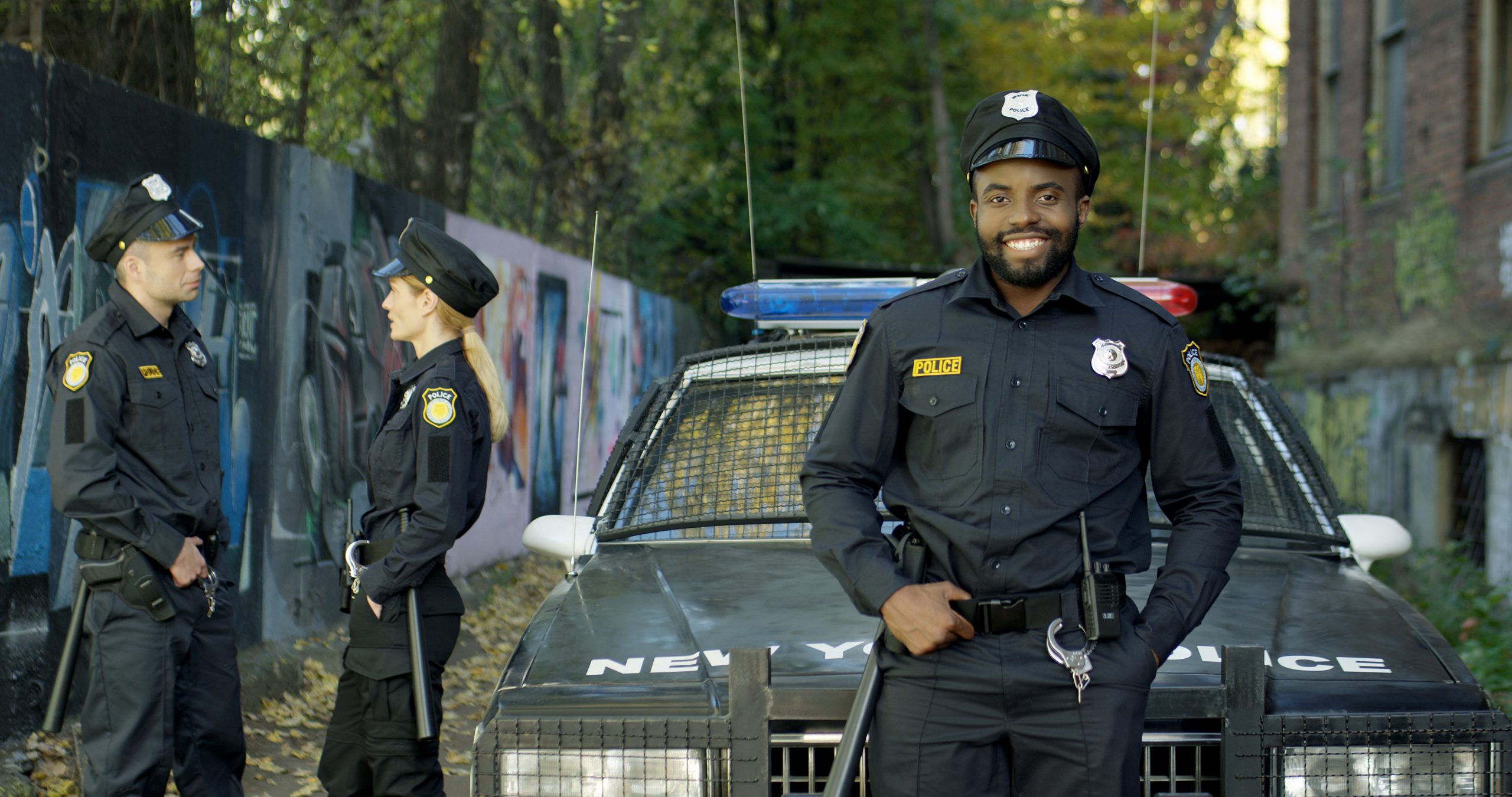Law enforcement: a great career for problem-solvers and change agents

www.degreechoices.com is an advertising-supported site. Featured or trusted partner programs and all school search, finder, or match results are for schools that compensate us. This compensation does not influence our school rankings, resource guides, or other editorially-independent information published on this site.
We all want to be protected from crime and disorder in our communities by people we can trust and who have a genuine desire to help. Police do not need to possess superhuman strength, but they do need good people skills, a desire to be of service to others and to help their community. Almost anyone who wants to make a difference and be a problem-solver can be a good police officer, and the need is greater now than it has been in a generation.
The current state of recruitment
Today, many law enforcement agencies are facing a hiring crisis. In some cases, retirements are outpacing even the most successful recruitment efforts. As a result, many law enforcement agencies are offering unprecedented recruitment incentives and cash bonuses to new hires. On top of this, police salaries are 27% higher than the average U.S. salary ($70,446 for policing vs $55,524 national average), with benefits such as pensions, take-home vehicles, and clothing allowances that are unavailable in other public sector careers.
Many departments are more flexible about entrance conditions, such as loosening the rules on prior credit problems, lowering educational attainment requirements, and relaxing standards for prior drug use.
To address the law enforcement hiring crunch, some departments are offering adaptations never considered before, such as flexible schedules, paid degree completion during the academy, and on-site childcare. Many departments are more flexible about entrance conditions, such as loosening the rules on prior credit problems, lowering educational attainment requirements, and relaxing standards for prior drug use. These, along with other innovative approaches to attracting new recruits, make this an excellent time to enter the field.
Popular online programs
www.degreechoices.com is an advertising-supported site. Featured or trusted partner programs and all school search, finder, or match results are for schools that compensate us. This compensation does not influence our school rankings, resource guides, or other editorially-independent information published on this site.
Skills and education needed for a career in law enforcement
Educational entrance requirements vary for law enforcement agencies. Many local departments require a minimum of high school completion, and a few years of either college or work experience, but state and federal agencies often require a 4-year degree.
Many law enforcement agencies already have partnerships with university criminal justice programs, the traditional pipeline for recruits. Yet, this is not the only degree that prepares students for work in policing.
The diverse range of subjects taught in 2- and 4-year degree programs can lead to success in a law enforcement career. Many law enforcement agencies already have partnerships with university criminal justice programs, the traditional pipeline for recruits. Yet, this is not the only degree that prepares students for work in policing. The demands of the job require communication and problem-solving skills that can be found in any communications, writing, or humanities curriculum.
Increasingly, the job demands technology skills, whether for investigating financial fraud and cybercrimes, or for conducting forensic analysis of evidence, such as drugs, DNA, or even computer hard drives. Therefore, students in technology programs might consider how they can apply their skills to the law enforcement field.
Depending on the community, being fluent in more than one language can be a valuable skill. As such, individuals from non-English speaking backgrounds, and graduates with majors in foreign languages, can be considered strong candidate for law enforcement.
Diffusing conflict is another important part of police work. This is often taught in hospitality and business administration coursework. It is also a skill that anyone with customer service skills, from a barista to a retail clerk, may possess.
Students of sociology or social work programs can make excellent patrol officers. Their educational background equips them with a unique ability to understand and connect with a diverse range of communities.
The need for diverse candidates in law enforcement
Law enforcement has been traditionally dominated by white males. Increasingly society is asking for the police to look “more like us,” placing enormous pressure on police executives to hire women and people of color.
The past few years have inspired a national cry for racial justice. There has also been fresh scrutiny of the gap in the diversity of police agencies and the communities they serve. In response, police leaders are seeking new ways to attract and hire a diverse pool of applicants. For interested candidates who are women and people of color, there are now numerous opportunities to enter law enforcement.
Current diversity levels
Today, women and people of color are underrepresented in policing. While about half of the country’s population is female, women constitute only 12% of total police officers, and only 3% of police leadership.
The same research indicates female officers are less inclined to use force against members of the public. They are also less likely to be involved in incidents of excessive use of force, or to be the subject of lawsuits made by the public against the police. The public sometimes see women as better communicators, with more honesty and compassion.
Meanwhile, the police force is 67% white, while as of the latest census, the country is only 61.6% white. Although the country may be growing more diverse, police forces have not changed as quickly as the population. As noted in a 2020 article in the New York Times: “most police forces did not keep pace with the changing demographics of their cities.”
Over the multi-year study, Black officers made 29% fewer stops, 21% fewer arrests, and had 32% fewer uses of force per shift than white officers.
Research shows that a diverse law enforcement agency may reduce disparate arrests and incarceration of people of color. Looking at 7,000 officers and 2.9 million shifts, the researchers found that Black and Hispanic officers make fewer stops and arrests of Black civilians than their white peers. They also use less force than white officers. Over the multi-year study, Black officers made 29% fewer stops, 21% fewer arrests, and had 32% fewer uses of force per shift than white officers.
According to the theory of representative bureaucracy, recruiting and retaining increased numbers of women and people of color may improve police legitimacy. This theory suggests that individuals act in ways that advance the interests of their group (racial, ethnic, gender, etc.), and that visible increases in representation among diverse groups translates into greater esteem for the organization across those groups.
Obstacles for diverse candidates
A career in law enforcement can be rewarding, both personally and financially. But getting the job can be a challenge as the process tends to be long. It often begins with a standardized test, which includes a physical fitness exam. This is followed by an extensive background investigation that can take months.
Some departments have a hiring process that lasts 1 or 2 years. For many candidates, this is simply too long and they self-select out of the process. For diverse candidates, these long wait times can lead to self-doubt about whether they will fit in. During the process, this sometimes makes attrition rates higher for diverse candidates. Perhaps just knowing this might help others to persevere.
Women and people of color may also be turned off by recruiting messages that show only, or predominantly, white male officers. This may cause them to opt out of the process before even applying. On their websites, some law enforcement agencies feature recruiters who span a wide range of groups, creating a literal welcoming face of the agency—so that diverse candidates can see themselves working there.
Research shows that after personal communication with a recruiter, recruitment videos are the next most important medium. A study examining 206 police recruitment videos found that 8% showed no officers of color, while 15% showed no female officers. For videos showing female officers, the amount of time they were speaking was half of that of the men.
Diverse candidates should be aware of how a department shows they are welcome, via their recruiting messages and their outreach methods. Some are making recruiters who are women and people of color visible to candidates through events specifically aimed at this demographic.
Strategies to navigate the recruitment process
Diverse candidates can seek out a mentor in the department to help them through the long and complex recruiting process. Departments that provide one-on-one support via mentors, navigators, or advisors, help applicants maintain momentum and stay on track with all steps in the process. They can also serve to make them feel more connected before they join.
In a survey of college students in criminal justice programs, 70% agreed that having a mentor would make a difference in choosing a career in policing. Personal connection to a recruiter and the encouragement of that individual have been shown to increase retention in the recruitment pipeline.
The Los Angeles Police Department (LAPD) found that one-third of those who dropped out of the recruitment process did so when it was time to write their personal statement.
Candidates of color, whose families are more likely to disapprove of the career choice than white recruits, might be especially helped by mentoring. Scholars recommend recasting the recruiter in a football coach model—meeting with the family, exercising with the candidate, building rapport, and opening lines of communication.
Finally, ask for help to find ways to persevere through the most challenging parts of the selection process. The Los Angeles Police Department (LAPD) found that one-third of those who dropped out of the recruitment process did so when it was time to write their personal statement. Working with the Behavioral Insights Team, the LAPD used text messages to encourage applicants to continue. In doing so, they achieved a 15% increase in applicants completing the process.
Insights into the impact of language in recruiting campaigns
Research shows that women are less likely to apply when a job description includes words that connote masculinity (e.g., competitive), rather than words associated with femininity (e.g., cooperation). Women interested in careers in policing should try not to be put off by overtly masculine language in job postings. It’s likely that the job posting hasn’t changed in decades, while the demands of the job have.
People of color interested in policing should be aware that there may be subtle and entrenched ways of communicating that may unintentionally reduce a minority candidate’s success. For example, research shows how language used in the selection process can suppress the success of minority candidates. One experiment in the UK modified the tone of the email inviting applicants to take a test— from an authoritarian to a welcoming one. This resulted in improved test scores for all, while closing the gap between whites and candidates of color.
More push-ups than donuts
Another way to increase the chances of getting hired is to keep fit. Some candidates remove themselves from the process because they are unable to meet fitness standards, or fear they can’t. You may be able to join free fitness classes to prepare before the academy, as many agencies now also make online and in person fitness classes available to recruits–a low cost way to boost fitness success rates.
Research shows that fitness standards which overemphasize upper-body strength not only discriminate against female candidates, but discourage women from even applying.
In Baltimore in 2017, 20% of applicants failed the fitness test, including 55% of women. To address both the rate of failure of the test as well as the disparate outcomes by gender, the Baltimore PD created a boot camp called “Fit to Serve.” This brought recruits to the academy for regular workouts that current officers could join as well.
Women interested in policing can look for departments that have modernized their fitness standards. Some departments have been identified as being discriminatory in their fitness and other selection processes, while others have moved to ways that are less discriminatory. Research shows that fitness standards which overemphasize upper-body strength not only discriminate against female candidates, but discourage women from even applying. To address this, some departments are altering fitness tests to include rowing, which tends to have gender neutral success rates compared to pushups.
Getting experience in law enforcement
It is important to know what the job entails before applying, because research shows that recruits who understand what the profession truly entails are less likely to leave early in their careers. As noted by Professor Christy Lopez, Georgetown University Law Center, “We know we’re losing people in part because of the disconnect between what the recruits thought the job would be and what it is.”
Therefore, recruits should be exposed to the full range of duties, including the less glamorous ones, so they are not disappointed once deployed. Ride-alongs, pre-academies, mentorships, job shadowing, and vlogs, such as Miami PD, have proved effective ways to achieve this.
Conclusion
Young people looking to make a difference and become leaders of their generation, can consider a career in law enforcement. It provides the chance to be well-compensated, and to become a change-agent and role model.
Reflecting on why he entered the profession nearly 2 decades ago, Worcester PD, Diversity Officer, Sergeant Derreck Leto, said, “This is the best time to become a police officer because you can be part of the change. I was a teenager when Rodney King happened and that inspired me to get involved.”
www.degreechoices.com is an advertising-supported site. Featured or trusted partner programs and all school search, finder, or match results are for schools that compensate us. This compensation does not influence our school rankings, resource guides, or other editorially-independent information published on this site.

